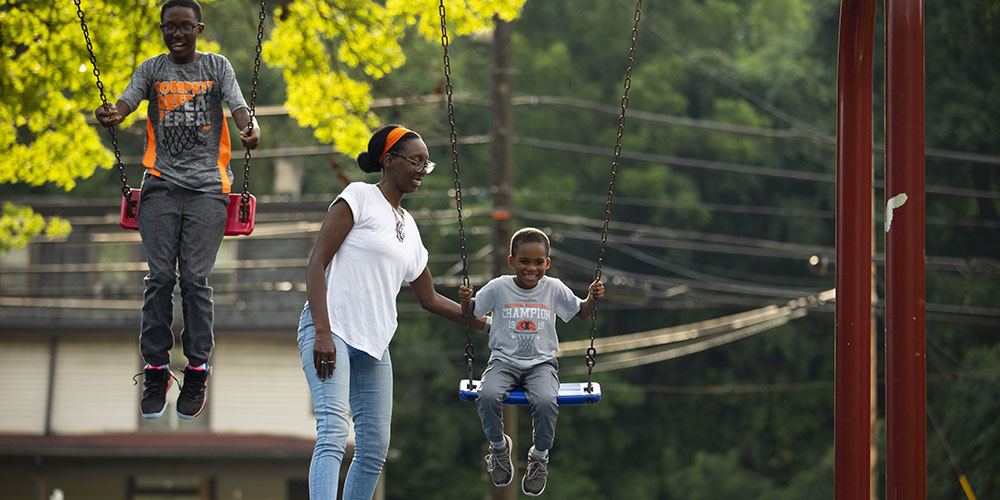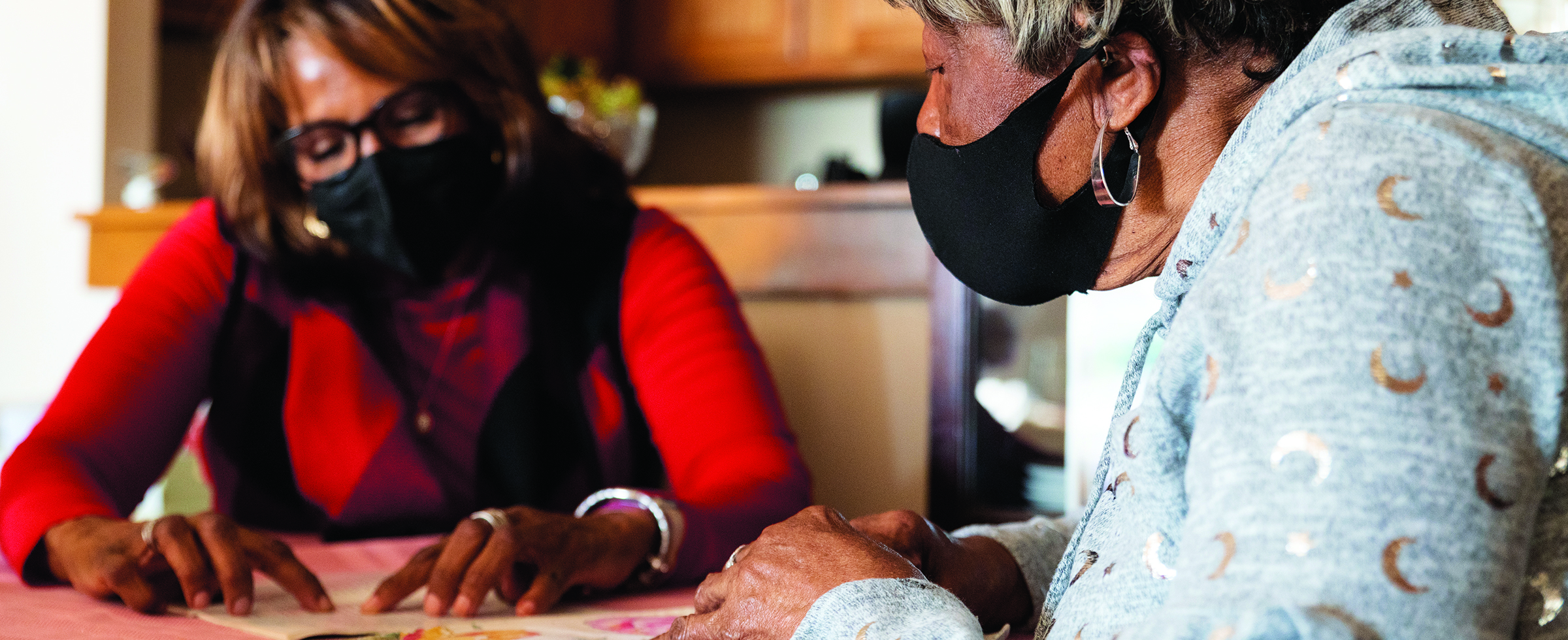Grants benefiting nonprofits serving single women with children

A direct outcome of The Pittsburgh Foundation’s 100 Percent Pittsburgh organizing principle has been increasing our grantmaking to organizations that improve conditions for single women raising children. Single women raising children were among the groups identified by the Foundation’s research as facing the greatest risk of poverty and inequality in our region. In Allegheny County, about 72% of families living below the poverty line are headed by single women raising children and 18% of children under 18 in the county live in poverty.
The Foundation’s efforts to better understand and meet the needs of single women with children began in 2017, when our Program staff began a two-year qualitative study of the issues these women face as they work to make a better life for themselves and their children. The study was published in January 2019. Findings of the study, supplemented with ongoing input from an advisory board of single mothers and advocates from organizations serving them, continue to influence our grantmaking. Single mothers like Brandi Lee are working hard to help their families thrive. In 2019, grants totaling about $843,000 were made to the following organizations:
Allegheny Family Network, $27,665 to support enhanced transportation for single mothers in Tarentum, Brackenridge, Natrona and Natrona Heights. Recognizing the difficulty that community members had with transportation to child care, education and basic needs, the Network implemented a free local shuttle service for single mothers ages 17 to 24 and their children three days a week in the morning and afternoon. The shuttle serves all eight Allegheny County Housing Authority communities and makes 13 stops, which include GED class locations, local WIC offices, food banks, libraries, doctor’s offices and grocery stores. This grant will continue the shuttle for an additional year and support the collection of ridership data to aid in advocacy for improved public transportation opportunities from county and state transportation authorities.
Bethlehem Haven of Pittsburgh, Inc., $75,000 to support single mothers and their families through the Safe At Home program, which provides short-term financial assistance to single mothers for housing-related expenses. The program helps families secure stable housing helps to prevent eviction. Families are either self-referred or directed to the program by Allegheny Link, United Way’s 211 Helpline or through local churches and landlords. In addition to emergency financial assistance for housing-related expenses, Safe at Home helps families find and apply for affordable housing and negotiate with landlords to avoid eviction or establish a payment plan for rent in arrears. Clients have access to a housing advocate to ensure long-term stability in housing. Clients may also use the on-site health and wellness clinic and the donation center.
Human Services Center Corporation, $60,000 for the Supports for Success program. Established in 1982 to improve the quality of life for children, adults and families in the Mon Valley area with a focus on high-need communities, Human Services Center is a collaborative leader connecting human service organizations to other agencies that can support their needs and provide resources to their clients. The Supports for Success program, an intensive one-on-one case management program, promotes self-sufficiency by helping participants gain financial management skills, connecting clients to education and training, and helping participants secure living-wage employment. Participants are matched with a social worker who assesses their needs and abilities, leading to the development of a goal plan that considers employment, education, income and asset building, housing, mental and physical health, and civic engagement. The program currently serves 30 people a year, most of them women, and at least half are single women raising children. The program also provides cash assistance to participants to cover expenses, such as transportation costs, that limit participation in the program. Participants also receive a small cash incentive to keep them motivated and involved, while helping meet basic needs.
Jeremiah's Place, $60,000 to extend the service hours of the Strong Families program for single mothers seeking emergency child care. Jeremiah’s Place is the only crisis nursery in Pittsburgh providing free, confidential, emergency child care for children ages six and under when their families are in need of temporary assistance. More than 70% of families served are headed by a single mother or grandmother. With this grant, Jeremiah’s Place will add a part-time family engagement specialist who will conduct intakes, admissions and discharges during evenings and weekend hours to allow families to attend appointments during hours that best work for their schedules. The grant will allow Jeremiah’s Place to conduct at least 10 additional intakes per month, to deepen engagement with families, particularly single mothers, and to increase the capacity of its social work staff to assess family needs and include family input on how to eliminate barriers to services.
Just Harvest Education Fund, $60,000 to support low-income single mothers and their families by defending and strengthening public safety net programs. This grant will support a community outreach and advocacy campaign focused on two critical programs targeting mothers and children: Temporary Assistance to Needy Families (TANF) and the Special Supplemental Food Program for Women, Infants, and Children (WIC). The campaign will begin with input from community partners, allies and benefits recipients to identify which policies cause the most distress. The campaign will then seek to build support for increasing the amount of TANF cash assistance to families, which hasn’t increased since 1990, and increase how much a recipient can earn, while still being eligible to receive TANF benefits. It will also advocate for increasing the portion of state block grants that Pennsylvania spends on TANF recipients. Other key elements include reducing administrative barriers to TANF participation, improving the effectiveness and accountability of TANF workforce development programs, and increasing participation on the PA Department of Human Services Income Maintenance Advisory Committee and regional WIC advisory board, and other advisory boards to ensure that voices of affected communities are heard and considered.
Jubilee Association, Inc., $75,000 to subsidize the cost of child care for low-income families at its high-quality child care center in the Hill District. Jubilee, which began in 1979 in the Hill District as a soup kitchen, now also provides additional resources including a food bank, job support services, transportation support, homeless prevention services and high-quality child care. This grant will support child care at the John Heinz Child Development Center. The program strives to improve kindergarten readiness and long-term success through an academically challenging and stimulating environment. This grant will subsidize child care for 36 children, ensuring the program’s affordability for families in need, while maintaining its high quality by hiring and retaining qualified staff and maintaining a low child-to-teacher ratio.
Latino Community Center, $75,000 to assist single mothers in the Latino community. While the overall population of Allegheny County continues to decline, the Latino community in Allegheny County grew by 28% from 2010 to 2015. Latina women who are single mothers come to the Center with needs ranging from emergency child care, to emergency funding after an unexpected life event (such as detention and/or deportation of the partner) to transportation assistance. The grant will allow the Center to provide wrap-around services for at least 30 single mothers over the next two years. Services will include emergency child care and cash assistance for housing costs, medical expenses, food, clothing and medical bills. The grant will also help build a network of volunteers to assist with transportation for single mothers. Resources will include bilingual materials and YouTube videos, and a series of workshops around financial management, home repairs and maintenance, and credit scores. These programs will also encourage respite and self-care for single mothers.
A Peace of Mind Inc., $25,000, to improve the quality of programming and subsidize tuition for children experiencing poverty at its child carechild care facility in Wilkinsburg. A Peace of Mind was founded in 2013 by two single mothers to provide quality caring therapy. The organization established an early child care and learning center in March 2019. This program currently serves 32 children between the ages of 10 months and 12 years. The organization seeks to significantly improve the quality of its program by implementing assessment tools, purchasing and utilizing a quality curriculum, supporting staff professional development opportunities and strengthening parent engagement. Also planned is a twice-weekly student enrichment activity, such as yoga, American Sign Language, violin, gardening and chess. This grant responds to the lack of child care availability outside of traditional work hours and makes it possible for A Peace of Mind to purchase a high-quality curriculum and assessment materials and subsidize child care for seven children to attend programming during the extended hours.
Single Mom Defined, $35,000 to organize four babysitting cooperatives designed by participants. Single Mom Defined is an online and in-person support group of 13,000 mothers, most of whom are African American with children under the age of 18, and many dealing with financial difficulties or weak support systems. The group asked moms what they needed most. Many said they wanted more connection with other moms and better access to child care. This grant will fund the launch of four babysitting cooperatives, with participants recruited through community information sessions and online forums. The babysitting cooperative will connect families who will share babysitting among themselves without the exchange of money. A steering committee of 12 single mothers with professional expertise in human services, child care and project management will provide advice, guidance and oversight. The goal is to connect 20 mothers, with 75% reporting increased peer connections and greater access to services while reducing isolation and stress.
Travelers Aid Society of Pittsburgh, $100,000, to provide transportation services to help single mothers access employment opportunities and human services supports. In focus groups conducted to inform the research, single mothers indicated that lack of reliable transportation makes accessing job opportunities and human services extremely challenging, particularly in communities outside the City of Pittsburgh. Through this partnership, transportation will be provided through five organizations that serve single women and already recognize transportation as a barrier to service: Jeremiah’s Place crisis nursery, Just Harvest Education Fund, Jubilee Association, the Latino Community Center and the Women’s Center and Shelter. Assistance will include Port Authority bus passes; GetGo gasoline debit cards; automobile support service for minor car repairs, inspection, registration, driving lessons, obtaining or renewing drivers’ licenses; and ride hailing support for Lyft/Uber rides. The maximum amount per participant is $400. Travelers Aid already provides about $4 million of transportation services annually to an average of 7,500 individuals a month through bus passes, gas debit cards and ride hailing services.
Trying Together, $100,000 to support the Start Strong PA advocacy campaign for child care in Pennsylvania. Trying Together works to support high-quality care and education for young children from birth until age nine. The grant supports the Strong Start PA advocacy campaign to assure that all eligible low-income families with children under age six have access to subsidized child care. The four pillars of the campaign are increasing state funding to assure that high-quality child carechild care is affordable for every family in Pennsylvania; sufficient payments to child care programs; adequate compensation to attract and retain early learning professionals; and oversight, accountability and evaluation of the child care system.
Women's Center and Shelter of Greater Pittsburgh, $75,000 to support the Emergency Shelter, 24-Hour Hotline and Children’s programs. Women’s Center and Shelter of Greater Pittsburgh advances the safety and well-being of victims of intimate partner violence, providing emergency response to victims and their children. The organization serves about 6,000 people per year, approximately 50% from single women-headed households, many of whom struggle to provide financially for themselves and their children after they leave their abusers. This grant will support services that facilitate healing and help women and their families find a new start. The 24-hour hotline connects women to trained advocates who assess for safety risk, offer counseling and assist women with safety planning whether they are leaving or choosing to remain in the abusive relationship. The 47-bed emergency shelter provides a place to sleep, personal care essentials and advocates who assist women with creating a plan for permanent housing, career and education, health care and financial assistance. Advocates with the children’s program care for children in shelter, provide individual and group counseling, academic supports, and access to health services. The shelter also provides twice-weekly "Mom and Me Groups" to strengthen family bonds and create connections to other women and free, on-site child care to all mothers.
Women and Girls Foundation of Southwest PA, $75,000 to support FY 2020 efforts to decrease poverty rates for women by raising awareness and developing support for paid family and medical leave in Pennsylvania. This grant to The Women and Girls Foundation of Southwestern Pennsylvania and Pathways PA will help fund the development of an advocacy campaign to win state legislative approval of the Family Care Act, which would guarantee paid family and medical leave in Pennsylvania. The state currently offers no paid family and medical leave program when workers need time off to care for elderly or disabled relatives, for newborn babies or newly adopted children, for sick children, or even for themselves after a serious illness. Bipartisan legislation has been introduced in the General Assembly to establish a fund that would function much like workers’ compensation, drawing a half-cent per dollar through payroll deductions. The program would cover all Pennsylvania workers and their families and would be a major victory for people in minimum-wage or low-skilled jobs that don’t offer paid time off.
More information about the Foundation’s focus on single women raising children may be found on the 100 Percent Pittsburgh section of its website.


